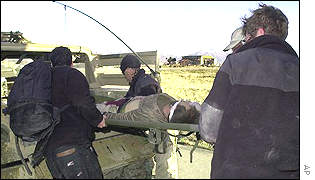| You are in: Americas | ||||||||||||||||||||||||||||||||||||||||||||||||||||||||||||||||||||||||||||||||||||||||||||||||||||||||||||||||||||||||||||||||||||||||||||||||||||||||||||||||||||||||||||||||||||||||||||||||||||
|
Monday, 4 March, 2002, 23:05 GMT
Analysis: Last stand or long war?

The US has sustained its first major losses
You might have thought it was all over - but it isn't. The deaths of American soldiers in an operation against al-Qaeda and Taleban fighters in eastern Afghanistan shows that the war is still very much going on - and that, for the first time, the Americans are taking serious casualties. President Bush is trying to rally the nation by saying that the lives had been lost in "an important cause". The upsurge is not something, though, which has come out of nowhere. Careful planning The United States has been methodically and carefully monitoring the remnants of al-Qaeda and Taleban (especially its non-Afghan elements) as they concentrated in mountains not far from Gardez. A counter-attack force was assembled - 1,000 Afghans loyal to the government, supported by several hundred Americans from the 10th Mountain Division, the 101st Airborne Division and special forces. Also there, though not necessarily in a combat role, are troops from allies including France, Australia and Germany.
The plan has been to surround the al-Qaeda fighters, and cut them off from escape routes into Pakistan, and then to pulverise them from the air. The hope is that tactical errors made in attacks on the Tora Bora caves last year can be avoided. Then many Islamist fighters, maybe even Osama Bin Laden, escaped. Now the aim is that they should be contained and then forced to surrender or be killed. The Americans left Tora Bora to the locals. This time they are taking a more active role. But even so, most of the attacks are from the air. And a new weapon is being used - the thermobaric bomb. From the Greek words for heat and pressure, this fearsome weapon - also used by the Russians in Chechnya - spreads an explosive cloud through a cave system and then sets it off. Wrapping it up? Is this al-Qaeda's last stand? Or just another battle in what will become a long drawn out guerrilla war? Are the Americans heading for trouble as the Russians did?
It is unlikely to go as badly wrong as it did for the Russians. They were fighting a whole movement. But it is not an easy fight. The terrain is classic Afghanistan. And the first assault, on the ground, was met with strong resistance. So the coalition forces were pulled back to let the bombers do their business. And the question, of course, arises as to whether Americans at home will tolerate casualties. Domestic support For the moment, it seems that they will. There is a new mood here since 11 September. It is grim and it is determined. Not everyone around the world understands this. Some criticise it. But it is there. Only a few voices have been raised against the "war on terrorism." Gone are the doubts which inhibited the American military post-Vietnam. But if this drags on for months, even years, difficult issues will arise for the Bush administration. There will always be the temptation to send in just a "few more" troops to "finish the job", which mysteriously never seems to be finished. That point has not been reached and the Pentagon is hoping that this indeed will be the Taleban's last stand. The Chairman of the Joint Chiefs of Staff General Richard Myers remarked that the al-Qaeda fighters wanted to fight to the finish and the United States was willing to "accommodate them". |
See also:
23 Dec 01 | South Asia
27 Nov 01 | South Asia
07 Oct 01 | Americas
04 Mar 02 | South Asia
Internet links:
The BBC is not responsible for the content of external internet sites Top Americas stories now:
Links to more Americas stories are at the foot of the page.
|
||||||||||||||||||||||||||||||||||||||||||||||||||||||||||||||||||||||||||||||||||||||||||||||||||||||||||||||||||||||||||||||||||||||||||||||||||||||||||||||||||||||||||||||||||||||||||||||||||
|
Links to more Americas stories |
 |
||
| ----------------------------------------------------------------------------------
To BBC Sport>> | To BBC Weather>> | To BBC World Service>> ---------------------------------------------------------------------------------- © MMIII | News Sources | Privacy |